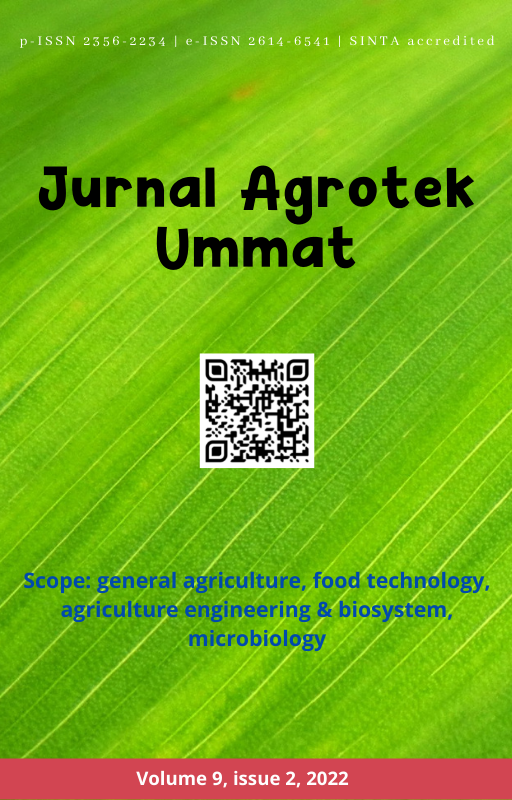Farmers' attitudes against system innovation adoption plant jajar legowo
DOI:
https://doi.org/10.31764/jau.v9i2.8194Keywords:
agricultural product, Farmers' attitude, jajar legowo, planting systemAbstract
The jajar legowo planting system needs to be implemented in all regencies/cities in North Sumatra, because this planting system is an attempt to optimized agricultural yields. This study purposes were: 1) determined the farmers’ attitude to implement the jajar legowo system; 2) determined the factors that influence the implementation of jajar legowo system at the research site; and 3) determined how farmers implemented the jajar legowo planting system at the research site. The method used to determine the research location applies purposive sampling. The method of determining the sample used is "Stratified Random Sampling" based on the area of land cultivated by farmers. The analytical method to determine the factors that influenced the farmers’ attitude to implement the jajar legowo system used a Liker scale, while the analytical method determined the factors that influenced the implementation of the jajar legowo system used multiple linear regression. The research results can be concluded that 1) the farmers’ positive attitudes towards the jajar legowo system were 16 people (53.33%), and negative attitudes were 14 people (46.67%). The positive attitude was shown by the farmers being satisfied with the jajar legowo system. 2) Simultaneously, the factors of physical capital, social capital, and human capital have not real influence on farmers’ attitudes in implementing the jajar legowo system. 3) Farmers who implement the jajar legowo system are 21 farmers (70%) and those who do not implement it are 9 farmers (30%).
References
Abdulrachman, S., Mejaya, M. J., Agustiani, N., Gunawan, I., Sasmita, P., & Guswara, A. (2013). Sistem Tanam Legowo. https://doi.org/10.1016/B978-0-08-052349-1.00034-2
Agri, J., Vol, S., Dan, M., Penerapan, E., Tanam, S., Legowo, J., Usaha, P., Padi, T., Di, S., Cermin, D., Kecamatan, A., Koto, V., Kabupaten, I., & Azhar, H. S. (2017). e-ISSN :2581-0227. 02(02).
Ahmadi, R. (2012). Pemberdayaan Masyarakat Miskin: Pendekatan Modal Manusia. Jurnal Kebijakan Publik, 10(2), 16–31.
Alviana, E. D., Gultom, D. T., & Syarief, Y. A. (2018). Farmer Response of Legowo Row Planting System in Tumijajar Subdistrict, West Tulang Bawang Regency. Jurnal Ilmu-Ilmu Agribisnis, 6(3), 305–312. http://jurnal.fp.unila.ac.id/index.php/JIA/article/view/3028/2417
Asminar, S.P., M.Si, 2015. Produktivitas Tanaman Padi di Kabupaten Tebo Tahun 2015, Kabupaten Tebo.
Balai Besar Pelatihan Pertanian (BBPP). 2013. Sistem Jajar Legowo Dapat Meningkatkan Produktifitas Padi. Balai Besar Pelatihan Pertanian. Ketindan. (Online). [diakses 27 Februari 2016]..
Bagagiolo, G., Vigoroso, L., & Pampuro, N. (2022). The Role of Social Interaction and Personal Characteristics in Affecting the Adoption of Compost from Organic Fraction of Municipal Solid Waste in Italy.
Belakang, A. L. (2012). Rita Nurmalina Suryana, Swasembada Beras yang Berkelanjutan Untuk Mendukung Ketahanan Pangan Nasional , Vol 17 No 2, Hal 29 1. 17(2), 1–7.
Boyko, K., & Derun, I. (2016). Disclosure of non-financial information in corporate social reporting as a strategy for improving management effectiveness. Journal of International Studies, 9(3), 159–177. https://doi.org/10.14254/2071-8330.2016/9-3/13
Chartered Institute of Personnel & Development; Ulster University. (2016). Reporting Human Capital: Illustrating your company ’ s true value. 1–52.
Endrizal. (2013). Sistem Tanam Padi Jajar Legowo. Badan Penelitian Dan Pengembangan Pertanian Kementrian Pertanian, 3(1), 1–22. http://jambi.litbang.pertanian.go.id/ind/images/PDF/bookletsistemtanampadijajarlegowo.pdf
Erwadi, Doli. (2012). Peran Penyuluh Pertanian Dalam Mengaktifkan Kelompok Tani Di Kecamatan Lubuk Alung. Universitas Andalas. Padang.
Ikehi, M. E., Ejiofor, T. E., Ifeanyieze, F. O., Nwachukwu, C. U., & Ali, C. C. (2022). Adoption of agricultural innovations by farmers in Enugu State, Nigeria. International Journal of Agricultural Technology, 18(1), 123–140.
Indiahono, D. (2021). Bureaucratic Reform by Building Trust in Citizens: Best Practices from Local Online Complaints. Policy & Governance Review, 5(2), 146. https://doi.org/10.30589/pgr.v5i2.347
Nurgrayasa O. (2015). Mencermati Lonjakan Harga Beras Nasional. setkab. https://setkab.go.id/mencermati-lonjakan-harga-beras-nasional/
Pakpahan, H. T. (2017). Tingkat Partisipasi Petani Wortel dalam Kelompok Tani dan Faktor-Faktor Yang Mempengaruhinya (Studi Kasus Desa Lingga, Kecamatan Simpang Empat Kabupaten Karo). Berkala Ilmiah AGRIDEVINA, 6 (2), 159-168.
Pakpahan, H. T. (2017). Penyuluhan Pertanian. Penerbit Plantaxia. Yogyakarta. https://scholar.google.com/citations?view_op=view_citation&hl=en&user=9tAE_eMAAAAJ&citation_for_view=9tAE_eMAAAAJ:Tyk-4Ss8FVUC.
Pakpahan HT; Sihombing YLV. 2021. Pembangunan Ekonomi Daerah Dan Desa. Penerbit Expert. Yogyakarta. https://scholar.google.com/citations?view_op=view_citation&hl=en&user=9tAE_eMAAAAJ&citation_for_view=9tAE_eMAAAAJ:roLk4NBRz8UC
Pangerang, 2013. Keuntungan dan kelebihan system jarak tanam jajar legowo padi sawah. PPL Kabupaten Maros.Http//pertanian.Trunojoyo.ac.id. Diakses Pada Tanggal 20 Agustus 2016.
Rana, K., & Mishra, I. (2022). I NTERNATIONAL JOURNAL OF Adoption of Recommended Beekeeping Practices in Kumaon Hills of Uttarakhand. 5(02), 279–283. https://doi.org/10.47191/ijmra/v5-i2-05
Romanelli, T. L., & Muñoz-arriola, F. (2022). Conceptual Framework to Integrate Economic Drivers of Decision Making for Technology Adoption in Agriculture †. 2–6.
Silalahi, Ulber. (2015). Metode Penelitian Sosial Kuantitatif.Bandung: PT. Refika Aditama.
Simatupang, D. I. S., Pakpahan, H. T., Fandri, O. (2021). The Influence Of Community Empowerment In The Development Of Andaliman Agro-Tourism In Taman Eden 100. International Journal of Educational Research & Social Sciences, 2 (6), 1331-1336 p. 1331-1336.https://ijersc.org/
Sirrapa, P.M. (2011). Kajian Perbaikan Teknologi Budidaya Padi melalui Kenggunaan Varietas Unggul DanSistem Tanam Jajar Legowo Dalam Meningkatkan Produktivitas Padi Mendukung Swasembada Pangan. Jurnal Budidaya Pertanian. Vol. 7, No. 2, p. 79-86.
Studi, P., Luar, P., Semarang, U. N., Session, F. D., & Hidup, K. (2020). Family Development Session Sebagai Upaya Peningkatan Keterampilan Hidup. 9(1), 57–67.
Downloads
Published
Issue
Section
License
Authors who publish articles in Jurnal Agrotek Ummatagree to the following terms:- Authors retain copyright of the article and grant the journal right of first publication with the work simultaneously licensed under a CC-BY-SA or The Creative Commons Attribution–ShareAlike License.
- Authors are able to enter into separate, additional contractual arrangements for the non-exclusive distribution of the journal's published version of the work (e.g., post it to an institutional repository or publish it in a book), with an acknowledgment of its initial publication in this journal.
- Authors are permitted and encouraged to post their work online (e.g., in institutional repositories or on their website) prior to and during the submission process, as it can lead to productive exchanges, as well as earlier and greater citation of published work (See The Effect of Open Access).

